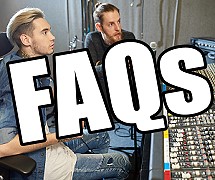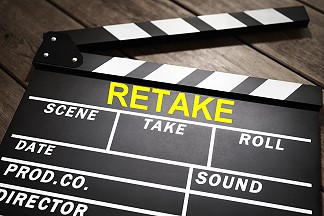
Here are answers to the Top 10 most common questions I receive. If you have any other questions, feel free to email me.
Can You Master MP3s?
Yes. I master MP3s every single week. A .wav is higher quality, but most listeners eventually have their streams converted down to MP3, or a similar lower quality format anyway. Nor can most listeners tell the difference between a 44.1 .wav file or a high quality MP3.
I will achieve great results with your MP3s!
I Have Some Old Poorly Recorded Songs. Can You Master Them?

Yes. Actually, this is a very common request. I’ve worked on many old rock song projects recorded on tape and transferred to .wav, or just poor quality recordings in general. I use restoration software that improves sound quality, and of course my standard mastering tools.
I can “improve” the quality of anything that’s sent to me. How much improvement depends on the quality of the files you send. Many times the results are surprisingly amazing! But, if you send something severely distorted, I can still improve it, but it’s basically damage control. Applying noise reduction, compression and cutting the highs so the song is bearable to listen to.
Can You Master Songs That Have Already Been Mastered?

Yes! I’m asked this question a few times a month.
Your mastering results depend on what you submit. Many times a client sends me a song and says it was already mastered, but NOTHING was done to it. This is considered an initial master. Your results will be great.
Or the song is partially mastered. Maybe the brightness and clarity is perfect, but I need to boost the bass, compress the upper-mids, and raise the volume level to bring it up to industry standard. The results are great here too.
The final scenario is the song was over-mastered. Too loud, distorted and too bright. I can improve it, but it’s basically damage control. Applying noise reduction, compression and cutting the highs so the song is bearable to listen to.
Regardless of what you send me, I can make it better, sometimes much better. It’s up to you whether or not you feel this improvement is worth paying for.
Can I Upload My Recording Session, Audio Folder, Or Random Audio Files For Mixing?
No. I use Cubase. If you upload FL studio, Reaper, Logic, Pro Tools, etc. I have no way to open it. And if you were to upload a Cubase session, what if you’re using plugins that I don’t have. I can’t work with sessions.
Each channel/stem has to be exported from the beginning of the song to the end. Just like when you export entire mixdown of a song, you have to export each channel/stem the exact same way.
If you don’t know how to do this, Google - “How to export stems for YOUR DAW.” Some software allow you to do them all at once in a batch, while others you have to solo each track(s) and export them one by one. Note - Mono export is fine where applicable, like single vocal tracks.
To test if you did it correctly, before submitting your files, import every file you are going to submit into your DAW software and start each track at 0:00. If your song plays in sync then you’re good to go!
Also, please do not upload the files from your audio folder or random audio files from your project. If these random files are all started at 0:00, they’ll all play at the same time out of sync. Once again, each channel/stem has to be exported from the beginning of the song to the end.
How Do I Preparing My Songs For Mixing Or Mastering?
How To Prepare Your Songs For MASTERING
How To Prepare Your Songs For MIXING
Do You Use Templates And Presets?

Of course not! I’ve been a pro sound engineer since 1999. For me, this is an art form, not a get rich quick scam! My goal is for your project to sound the very best it can, and I spend the time necessary to make that happen. Your entire CD has to sound consistent from song to song. Obviously, this cannot be achieved by using templates or software presets, or by hitting a button that says “master my enter CD in 3 minutes” on a website that implements this same technology.
Why won't presets and templates work? When a customer submits a CD project for mastering, the quality is usually pretty good, but each song will be off on a few random sonic quality. A few songs the bass will be a little too high or low. The same goes for the brightness level, and overall volume levels will vary from 1-4dbs from song to song. Usually all of the songs have no compression. This is normal. I’m just letting you know why auto mastering processes won’t work on an entire CD, and lack even if it’s one song. There are too many different variables.
I have to bring the sonic quality to an industry standard level for each song, individually. This gives your entire CD consistency from song to song.
Note - Of course you can start out with a template. We all do. But they're not set it and forget it.
Do You Edit And Master Podcasts And Audio Books?

Yes, both. I use all of the industry standard mastering techniques for the genre, and also use noise reduction software, I can also noise gate if necessary. Vocal/space editing is also available.
This is all done manually on a chapter by chapter basis, so each chapter is consistent and sounds like it was recorded all in one session, not over the course of several days. This is CRITICAL for a great audio book. You can’t have the sonic qualities of each chapter all over the map. This will detract from the listening experience.
Note - If you are submitting to ACX, I will audio master your files so they pass the ACX approval process.
Do My Songs Even Need To Be Mastered?
Yes! Someone has to master them! But this is a two part answer.
The term “Mastering” is adding the final effects to a song file (as a whole) that brings every sonic quality up to radio quality standards. These mastering effects are added to the main/stereo out bus.
If you sent me a song file and every single mastering sonic quality was already industry standard, then NO, you don’t need mastering by a sound engineer. You already did it yourself!
If any of your mastering sonic qualities are sub par, like bass, brightness, volume, etc., then your song needs to be mastered to correct these deficiencies.
Here’s another way to look at it. Mastering is done by adding effects on the main/stereo out bus. Asking if you need mastering, is like asking if you need to add effects to the main/stereo out bus.
The answer is, “Yes.” You have too. If you want your songs to be at industry standard volume level and not break up, want your EQ to blend from channel to channel, and maybe give your song an overall sparkle, this (and a lot more) is achieved by putting mastering effects on the main/stereo out bus. You can’t achieve this in channel mixing because channel mixing is not an overall process.
Whether YOU, or a Sound Engineer, masters your songs, someone has to do it by adding effects to the main/stereo out bus.
Why Is It So Difficult To Mix And Master My Own Music?

1. Song Familiarity
Because you know your own songs and all the lyrics very well. If for whatever reason, a portion of your vocals are inaudible, you already know all the words, so you can’t tell. Same goes for some of the individual instruments. The familiarity of your songs subconsciously destroys any objectivity.
If I listen to your songs, I never heard them before in my life (unless they’re remakes). I can tell you instantly what words I can’t understand (if any) and how to correct any vocal issues. I can also instantly hear if your kick is too low/high, if the snare is cutting through, guitar levels, hi hats etc. This is an example of the term, “I need some fresh ears.”
2. Wrong Objectives
When you mix and master your own music, you try to make it sound “good.” All artist/engineers do this. This is a correct procedure, but one thing is missing.
When I start mastering any project, I initially look at it from an “opposite” perspective. I look for what’s “wrong/bad” with the mix. I’m only looking for mistakes and errors, that I can fix. I correct them, and then let the artist know if there’s anything they need to correct in their mix to get a better mastering result.
Once all errors are corrected, then I change my mentality to “make this sound great” and tweak the song to achieve a professional result.
3. Lack Of Experience
Busy sound engineers constantly look for errors ALL DAY LONG! They stick out like a sore thumb to us. Like a doctor who’s looked at thousands of X-rays. He can quickly and accurately diagnose problems MUCH better than an intern working on his first patient.
The same goes for an inexperienced artist/engineer. Though they might know they need to check for errors, they might not be very at good finding them.
4. Didn’t Put The Time In
It’s simply not that easy to mix and master and get great results. There are a lot a different softwares, processors, settings, rules, and techniques that go into mixing and mastering music correctly.
Of course anyone can learn this, and become a great sound engineer. But when an artist spends hundreds of hours writing their lyrics, playing their music, and recording everything, they usually won’t spend another 200-300 hours learning the art mixing and mastering.
I get it. If I was an artist, I wouldn’t either! That’s why I’m here to help you!
What Gear Do You Use?
Here’s my main gear list -
Midas
Motu
TC Electronics
SSL
UAD
Genelec & Yamaha
AKG
Waves
